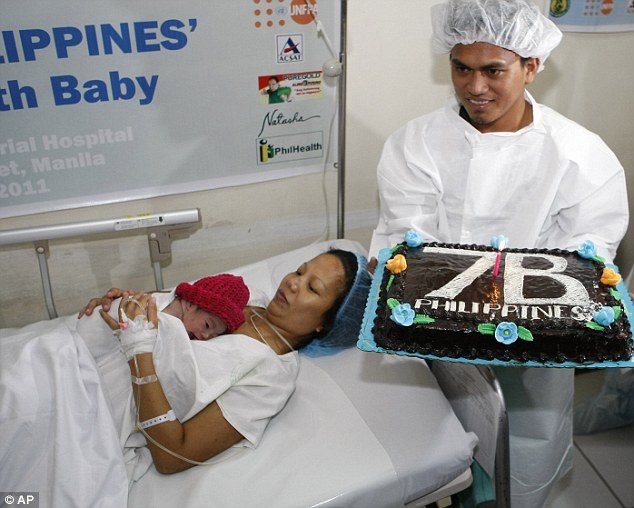
Danica May Camacho, born in Philippines last night, has been recognized by United Nations as one of the world’s symbolic “seven billionth” babies, presenting her with a special cake.
United Nations say Seven Billion Day – October 31 – is the date when the world’s population reaches landmark number.
The Philippines, which is ranked 12th as the most populated country in the world, joined the rest of the world as it welcomed its symbolic seven billionth baby in a simple ceremony at the hospital.
Danica May Camacho was born two minutes before midnight and arrived to a celebratory cheer at the packed Government-run Jose Fabella Hospital in Manila.
Weighing 5lbs 5oz (2,5 kg), Danica May Camacho was delivered amid an explosion of media flash bulbs in the delivery room at Manila’s Jose Fabella Memorial Hospital.

Danica May Camacho’s mother, Camille Dalura said:
“She looks so lovely. I can’t believe she is the world’s seventh billion.”
Danica May Camacho is the second child for Camille and her partner Florante, who quietly stood in a corner wearing a white hospital gown as television crews and photographers crowded to get a shot of his daughter.
Camille, Florante and Danica May Camacho were met by top United Nations officials in the Philippines, who presented the child with a cake.
There were also gifts from local benefactors including a scholarship grant for the child’s study, and a livelihood package to enable the parents to start a general store.
Lorrize Mae Guevarra, 12, who was declared the world’s symbolic six billionth baby in 1999 and is now in the sixth grade, was also present at the event.
Lorrize Mae Guevarra said: “I am very happy to see this cute baby. I hope like me she will grow up to become healthy and well loved by everyone.”
Danica May Camacho is one of several in countries around the world being declared a symbolic seven billionth human.
The United Nations has declared October 31 as Seven Billion day – the date when the world’s population is estimated to reach seven billion.
It was hoped Danica May Camacho would arrive at exactly midnight, but she was delivered two minutes early.
Health Secretary Enrique Ona said the arrival of the world’s seven billionth baby also presented the Philippines with an opportunity to assess population related issues.
According to the United Nations Population Fund (UNFPA) State of the World Population Report, the Philippines is the 12th most populous country in the world with 94.9 million people.
China continues to have the biggest share of the population at 1.35 billion, followed by India at 1.24 billion.
According to the report, in many parts of the developing world, where population growth outpaces economic growth, reproductive health care remains a crucial issue.
Ugochi Daniels, UNFPA representative said that while the Philippines population remains young, with people under 25 making up 54% of the total, they needed to be taught proper “life skills” and about sexual issues.
Ugochi Daniels said that while women were having fewer children globally, the overall population continued to go up.
“While our world of seven billion represents a complex picture of trends and paradoxes, there are some essential global truths we observe,” Ugochi Daniels said.
“Conversely, there is no one global population outlook.”
The UNFPA said 10% of Filipino girls aged 15 to 19 have started child bearing, with many of the young also increasingly vulnerable to HIV.
There is skepticism over the accuracy of the UN’s Seven Billion Day estimation, with critics saying there is no way of truly telling when the population of the human race hits the landmark.
In the past century, the world’s population has increased fourfold. And it has only been 12 years since the planet marked six billion people.
According to independent demographers, the United Nations has jumped the gun. Early 2013 is their best guess, but it could be as late as 2019 that the landmark is reached.
[youtube MWllmVlmuqA]